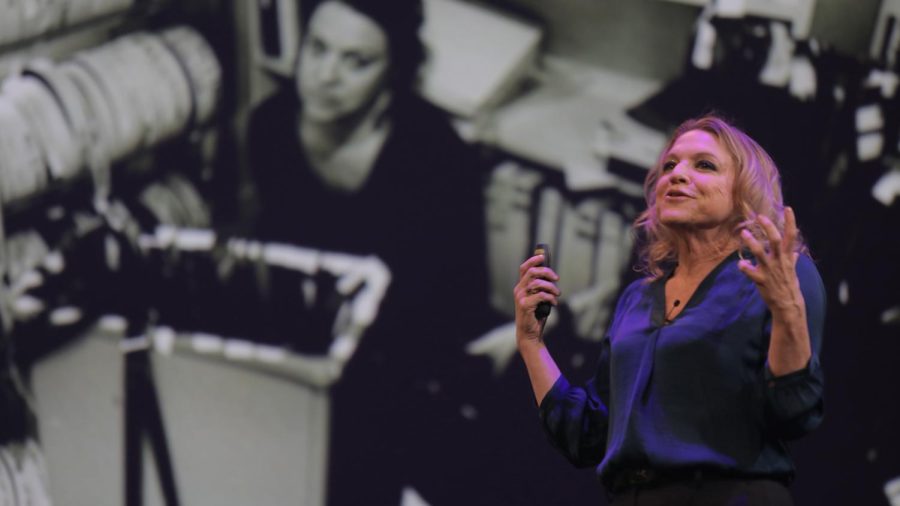Sundance: ‘Brainwashed: Sex-Camera-Power’ Dissects Cinematography’s Impact on Female Empowerment
January 25, 2022
In “Brainwashed: Sex-Camera-Power,” filmmaker Nina Menkes takes the content of her talk “Sex and Power: The Visual Language of Cinema” and translates it to documentary, compiling clips from over 175 films spanning a century and interviews from prominent filmmakers and theorists. Her thesis? Shot design in cinema is gendered, and some of the most beloved films have shaped a visual language that places women and female bodies as objects to be viewed by often male subjects.
Along with powerful insights from renowned female cinematographers, performers, film theorists and psychoanalysts, “Brainwashed” examines how, whether consciously or subconsciously, the content created in Hollywood disempowers women and contributes to employment discrimination of female filmmakers and the culture of sexual abuse and assault.
Cinematic Parallels
In its first few minutes, “Brainwashed” is a marriage between “The Twilight Zone” and a Ted Talk. We see Menkes on a stage, projections and disseminations of common cinema tropes behind her, an ominous score creeping underneath. The film settles into a more familiar style as she expertly explains the covert phenomenon of misogyny in film.
This familiarity is what makes “Brainwashed” so compelling, if not terrifying. Like the common apologue of a boiling frog, Menkes slowly turns up the temperature on what we tolerate in films — glamour, sexualization, violence — until the real horror shocks us into focus. From Hitchcock to Tarantino, we’ve acclimated to the language of these films. Even if we are aware of the sexist dialogue or lack of well-rounded female characters, we aren’t immune to the power dynamics woven into the visual language.
Few Female Filmmakers
Film theorist Laura Mulvey is the film’s first interviewee. Known for her 1975 essay “Visual Pleasure and Narrative Cinema” which coined the phrase “male gaze,” she identifies how Hollywood isn’t designed for female filmmakers, nor female audiences by “only retrospectively realizing that part of my pleasure in this film-going was that I was watching these movies as a male spectator.”
Another featured pundit is Iyabo Kwayana, a cinematographer and professor of Film and Media Studies at Dartmouth, who speaks to how narrative posturing sidelines and manipulates women. “The dissemination of these kinds of shots is actually a sort of global hypnosis around how masculine power brings satisfaction … this is propaganda for patriarchy,” she says.
Kwayana dissects this message of cultural toxicity from films, saying, “In a visual culture such as ours where there is a ravenous appetite towards the female as object, if the camera is predatory, then the culture is predatory as well.”
Cinema and Culture
Throughout the talk, Menkes quite literally joins the audience, sitting in gilded, red-velvet theatre seats awkwardly set on an otherwise empty stage. She’s not tearing apart beloved “masterpieces,” though it’s hard to call them that once their objectifying composition is clear, but scientifically breaking them down. “All of these techniques … we don’t know if they’re conscious or unconscious, but they’re deliberate,” she says. It’s a #MeToo era education that doesn’t shy away from cinema’s seedy underbelly, but focuses on pulling us out from the “powerful vortex of visual language from which it is very difficult to escape.”
“And when we’re talking about these scenes, they’re not really about sex. They’re about power, and the person who is shot like this is not empowered.” “Brainwashed” is clear — our perception of women in society has been slowly chipped away by the point of view, framing, camera movement, lighting and narrative that is synonymous with Hollywood.
This is not Menkes’ first rodeo, and at times it’s hard to watch, but her return to Sundance in “Brainwashed” is a masterful cinematic deep dive, a psychosocial analysis and cultural thriller wrapped into one. In the film, director Julie Dash reminds us of the words of Audre Lorde, “The master’s tools will never dismantle the master’s house.” “Brainwashed” provides a new set of tools, and it should be required viewing for anyone wanting to enter the industry.








